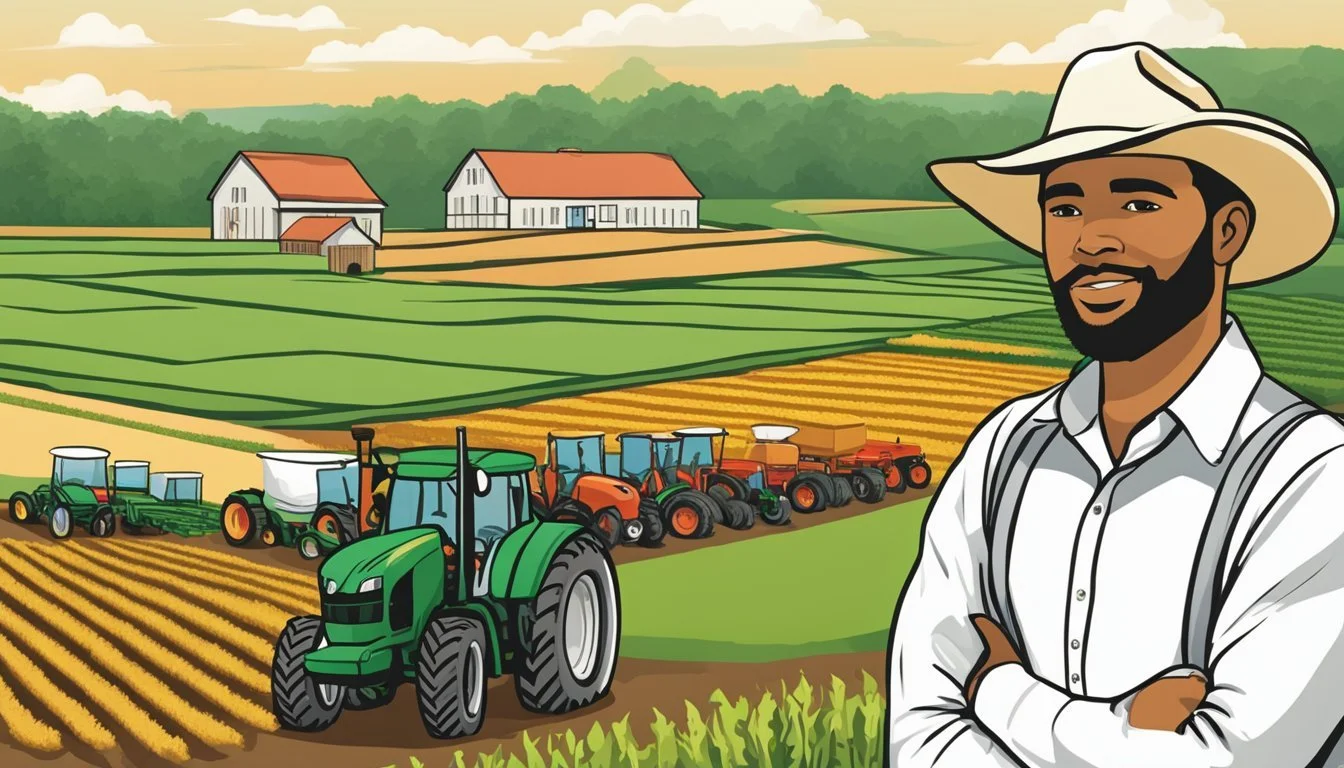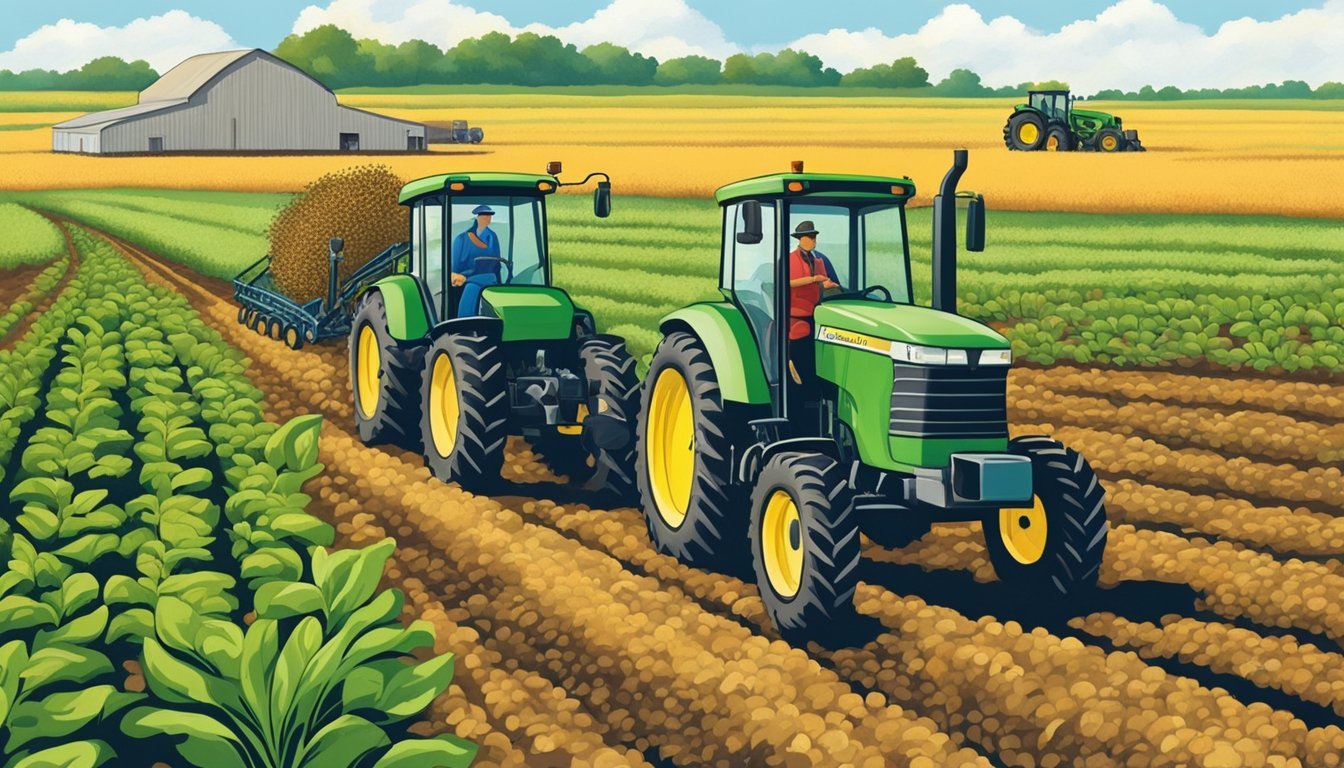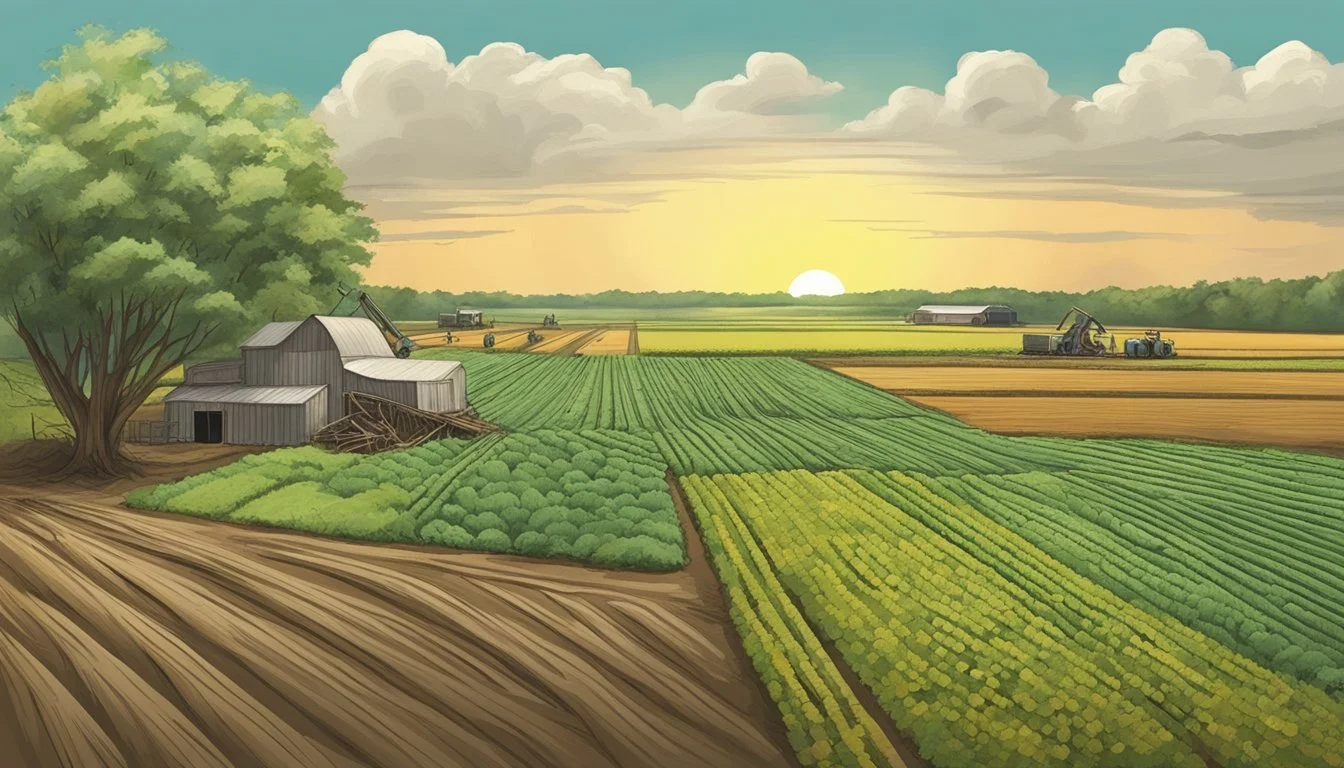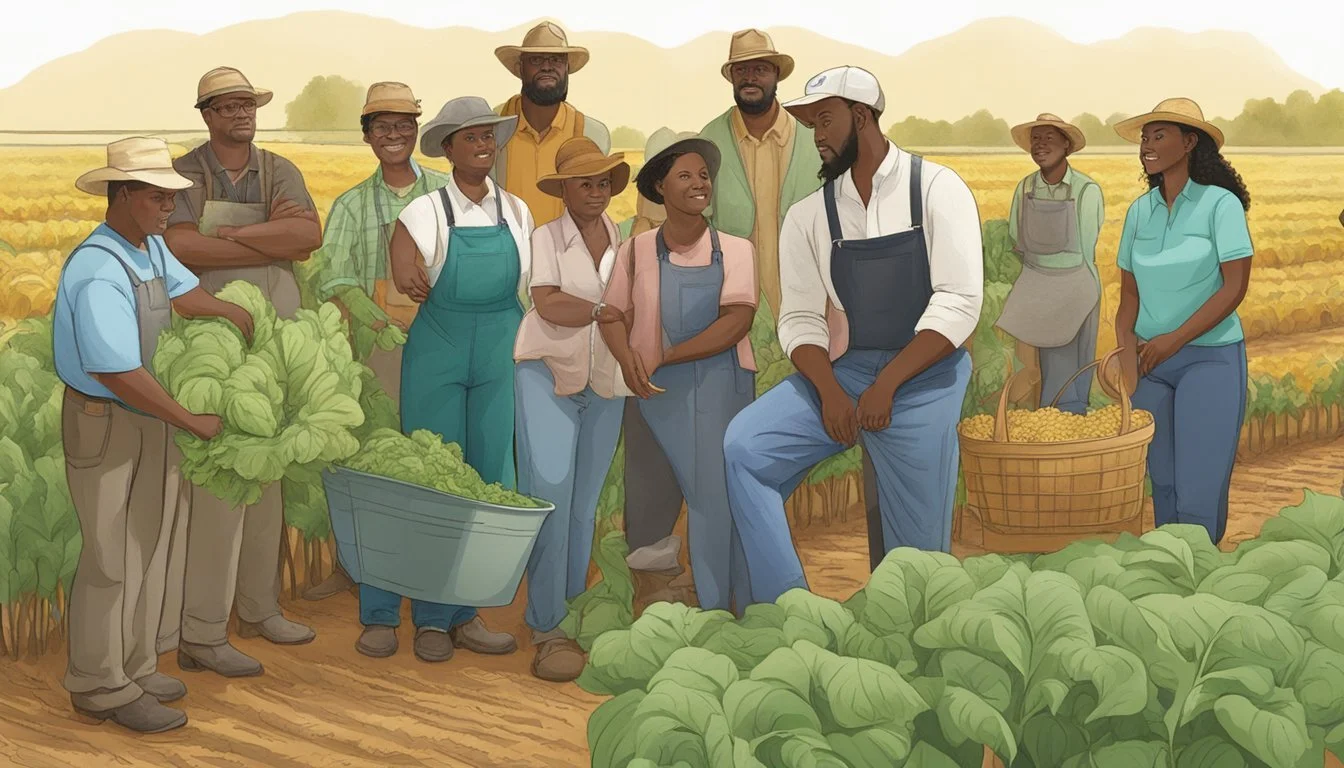Farming Grants Mississippi
Opportunities for Agricultural Funding
Agriculture remains a significant contributor to the economy of Mississippi, with a wide array of crops and livestock produced within the state. Recognizing the challenges faced by farmers, the state of Mississippi, along with federal agencies, provides various grants and aid programs designed to support the agricultural community. These programs not only assist with immediate needs following natural disasters but also promote long-term sustainability and innovation within the farming sector.
Mississippi's state-specific initiatives, such as the Mississippi Agriculture Stabilization Act (MASA), earmark funds for particular segments of the agricultural market like poultry and sweet potato farmers. Additionally, the Mississippi Supplemental CFAP Grant Program Fund supports farmers economically affected by market disruptions. Federal programs such as the USDA Farm Service Agency offer resources including the Livestock Forage Program, the Emergency Assistance for Livestock, Honey Bees and Farm-raised Fish (ELAP), and various loan programs catering to new and established farmers.
The availability of farming grants in Mississippi spans a broad spectrum, covering everything from small individual projects to large-scale agricultural operations. Support is multifaceted, ranging from grant funds to assist with the adoption of climate-smart agricultural practices to Value Added Producer Grants, which help farmers add value to their products. These financial tools are critical in ensuring the vitality and progression of Mississippi's agricultural industry.
Overview of Farming Grants in Mississippi
Mississippi offers a variety of farming grants designed to support the state's agriculture sector. These grants target specific needs such as assistance programs for livestock, incentives for specialty crop production, and support for value-added activities that can increase farmer income.
USDA Farm Service Agency Programs The USDA Farm Service Agency administers multiple programs in Mississippi, such as:
Livestock Forage Program (LFP)
Emergency Assistance for Livestock, Honey Bees, and Farm-raised Fish (ELAP)
Livestock Indemnity Program (LIP)
Noninsured Assistance Program (NAP)
Tree Assistance Program (TAP)
Farm Loan Programs, which are available for beginning farmers and ranchers, direct farm loans, and more.
Specialty Crop Block Grant Program Funded by the Agriculture Improvement Act of 2018, these grants are directed at enhancing the competitiveness of specialty crops within the state.
Grant Program Funding Entity Purpose Specialty Crop Block Grant Program USDA Enhance competitiveness of specialty crops Value-Added Producer Grants (VAPG) USDA Rural Development Support value-added agricultural activities
Value-Added Producer Grants (VAPG) VAPG helps producers in developing new products and expanding market opportunities, prioritizing:
Beginning farmers or ranchers
Socially-disadvantaged farmers or ranchers
Small or medium-sized farms
Agricultural Funding Resources Entities like Ambrook offer a collection of agriculture-related funding options available in Mississippi, which includes grants, loans, and other programs aimed at sustainable practice integration and reducing greenhouse gas emissions.
Mississippi's assortment of farming grants demonstrates the state and federal commitment to bolstering the agricultural economy, providing resources for innovation, risk management, and marketing ventures for producers across the state.
Grant Eligibility and Application Process
In Mississippi, there are specific requirements and timelines that entities must follow to secure farming grants. Understanding these intricacies is crucial for successful grant acquisition.
Eligible Entities
State and local organizations, academia, producer associations, industry or community-based groups, and other specialty crop organizations are among the entities eligible to apply for farming grants in Mississippi. Particularly, the Specialty Crop Block Grant Program (SCBGP) is aimed at entities such as state departments of agriculture, to enhance the competitiveness of specialty crops.
Application Requirements
Applicants must provide a completed application, adhering to the guidelines included in the Request for Proposals (RFP). For instance, the FY2024 RFP for the SCBGP details the necessary steps and documentation required. Eligibility stretches to include agricultural producer groups, farmer- or rancher-cooperatives, and majority-controlled producer-based business ventures for programs like the Value Added Producer Grants.
Submission Deadlines
Program Open Date Close Date Specialty Crop Block Grant Program (SCBGP) Will vary yearly Will vary yearly Rural Business Development Grants (RBDG) January 2, 2024 April 1, 2024
Deadlines are strictly enforced; for instance, the RBDG clearly states a close date of April 1, 2024. Applicants should closely monitor for Federal Register notices, as they can provide critical updates, like the one published on December 14, 2023, which may influence the program access and deadlines.
Types of Farming Grants
In Mississippi, farming grants are vital for supporting agricultural practices, from specialty crop cultivation to the expansion of farm operations. These grants address equipment needs, nutrition, market development, and health projects among others.
Federal and State Grants
The Specialty Crop Block Grant Program funded by the United States Department of Agriculture (USDA) and authorized by the Agriculture Improvement Act of 2018 (the Farm Bill) focuses on enhancing the competitiveness of specialty crops. State departments of agriculture utilize these funds to support various aspects of specialty crop production including market expansion and health initiatives.
Conservation Climate-Smart Grants: Targeting crops such as corn, soybeans, (how long do soybeans last?) and wheat; these grants support climate-smart agriculture practices.
Livestock Forage Program (LFP): Assistance for livestock during drought or fire.
Emergency Assistance for Livestock, Honey Bees, and Farm-raised Fish (ELAP): Offers aid following emergencies affecting health and feeding.
Research and Development Grants
Research grants in Mississippi are directed at agricultural innovation and training, ensuring that farmers remain at the cutting edge of agronomic practices. Foundations and federal agencies provide funding for these grants.
Agricultural and Rural Grants: These support nonprofits, businesses, and individuals undertaking agriculture research and community agricultural projects.
Education and Training: Projects that focus on developing new farming techniques and expanding knowledge are funded to enhance agricultural productivity.
Agricultural Expansion Grants
Grants for agricultural expansion ensure that farms can scale their operations sustainably, with an emphasis on equipment modernization and increasing nutritional output.
Value Added Producer Grants: Aimed at farmers interested in creating or expanding value-added products, this program has specific deadlines set for application submissions.
Direct Farm Loans: Offer financial assistance for purchasing equipment or farm expansion.
Farm loan programs and beginning farmer loans often accompany expansion grants, providing a combination of direct financial support and capital for growth.
Specific Grant Programs
Mississippi offers a diverse range of agricultural grant programs aimed at supporting the state's farmers and ranchers. These programs are designed to provide financial assistance and bolster the competitiveness of various agricultural sectors including crop production, livestock, and specialty crops.
USDA Grant Programs
Livestock Forage Program (LFP) and Emergency Assistance for Livestock, Honey Bees and Farm-raised Fish (ELAP) cater to ranchers and producers facing emergency conditions. The LFP aids in compensating for forage losses due to drought, while ELAP offers funds for losses due to adverse weather or loss conditions.
For beginning farmers and ranchers, the USDA offers loans and grants to support their endeavors. Direct Farm Loans are available, creating an entry point for these individuals into farming by offering the necessary capital.
The Noninsured Assistance Program (NAP) supports producers who have faced crop losses due to natural disasters, ensuring they have a financial safety net. Additionally, organic farmers benefit from programs aimed at market access and conservation, with grant options promoting organic certification and sustainable practices.
Value Added Producer Grants in Mississippi, under the umbrella of USDA Rural Development, specifically target agricultural producers interested in adding value to their products, enhancing their viability and market access. These grants have deadlines that applicants must heed, such as the paper application due April 16, 2024, and electronic submission by April 11, 2024.
Mississippi State-Specific Programs
The state has implemented programs like Mississippi Agriculture Stabilization Act (MASA), which encompasses several funds including the Poultry Farmer Stabilization Grant Fund and the Sweet Potato Farm Sustainment Grant Program Fund, to support specific sectors within the state's agricultural community.
Further, the Specialty Crop Block Grant Program aims to enhance the competitiveness of specialty crops through grants managed by the Mississippi Department of Agriculture.
For producers focused on sustainability and the environment, funding options like the Conservation Climate-Smart Solutions grant encourage farming practices that are both ecologically responsible and economically beneficial.
Eligible areas for these grants and programs often include diverse agricultural enterprises, emphasizing the inclusivity of the state's effort to support its producers in various forms of agriculture.
Grant Funding for Conservation Efforts
In Mississippi, grant funding for conservation is a critical resource supporting agricultural sustainability and environmental quality. Focus is placed on programs that reduce greenhouse gas emissions and enhance land conservation.
Conservation Programs
The Conservation Reserve Program (CRP) and Conservation Reserve Enhancement Program (CREP) are cornerstone initiatives funded through grants to encourage farmers and landowners to convert environmentally sensitive agricultural land into habitat that benefits soil, water, and wildlife. The CRP offers financial compensation for taking agricultural land out of production and implementing conservation practices. Similarly, the CREP provides additional state and federal funds for high-priority conservation issues identified by local governments or non-governmental organizations.
Environmental Quality
Mississippi's farmers have access to the Environmental Quality Incentives Program (EQIP), which provides financial and technical assistance to implement conservation practices that improve soil, water, plant, animal, air, and related resources on agricultural land and non-industrial private forestland. Initiatives under EQIP also target reductions in greenhouse gas emissions and may include efforts like improved manure management systems that mitigate against methane emissions from livestock operations.
The Emergency Conservation Program (ECP) helps farmers recover from the ravages of natural disasters by offering funding to rehabilitate farmland. Restoration efforts may include creating water conservation methods or repairing damage caused by natural disasters that disrupt the land's capacity to function properly.
Disaster and Emergency Relief Grants
Farmers in Mississippi coping with the aftermath of natural disasters have access to various assistance programs. These initiatives are tailored to provide financial support and technical aid in the recovery process.
Emergency Assistance Programs
Emergency Assistance for Livestock, Honey Bees and Farm-raised Fish (ELAP): This program supports eligible producers who face emergency conditions.
Livestock Indemnity Program (LIP): Offers compensation to livestock producers for livestock deaths caused by adverse weather.
Program Purpose ELAP Assists with livestock, honeybee, and farm-raised fish losses. LIP Compensates for weather-related livestock deaths.
Tree Assistance
The Tree Assistance Program (TAP) extends help to orchardists and nursery tree growers for replanting and rehabilitating eligible trees, bushes, and vines affected by natural disasters.
Farmers may also avail themselves of Emergency Farm Loans, which provide necessary capital to help them return their operations to normal following a disaster.
In conclusion, these programs provide a safety net for those impacted by natural calamities, aiding in the stabilization and sustainment of agricultural operations within Mississippi. Eligibility and specific procedures can be obtained through relevant local agencies or the USDA website.
Loan Programs and Financial Support
In Mississippi, farmers can access various loan programs and financial support initiatives to sustain and enhance their agricultural operations. These programs are designed to provide economic stability and encourage growth in the agricultural sector.
Guaranteed Farm Loans
Guaranteed farm loans offer financial backbone to farmers and ranchers in Mississippi. The USDA backs these loans, enhancing lenders' ability to extend credit to agricultural businesses. Types of Guaranteed Loans include:
Operating loans: For daily farm needs.
Ownership loans: For farm acquisition or expansion.
Commodity and Facility Loans
Mississippi producers can benefit from commodity and facility loans to manage their inventories and resources. Two key programs are:
Price Loss Coverage (PLC): A financial safety net for producers when market prices for covered commodities fall below their effective reference prices.
Commodity Loan Program: Low-interest loans that provide short-term financing, allowing producers to store their commodities and sell when market conditions are favorable.
Facility Loan Program: These loans aid in building or upgrading storage facilities for eligible commodities like grains, oilseeds, and peanuts.
Additional Support and Resources
Mississippi farmers have access to a variety of programs and initiatives specifically designed to bolster the agriculture industry. These cover a range of needs including technical support, health and nutrition programs, and avenues to enhance market presence.
Technical Assistance and Training
Mississippi's agriculture sector benefits from technical assistance and training programs, which are crucial for both new and established farmers. Entities like the USDA's Farm Service Agency offer support through various farm loan programs, emphasizing opportunities for beginning farmers and ranchers. Resources are also available for emergency farm management and grant training to navigate federal assistance.
Farm Loan Programs: Guidance on accessing credit and capital.
Grant Training: Workshops on how to apply for and manage grants.
Nutrition and Health Initiatives
The state places a significant emphasis on nutrition and health initiatives, with programs aimed at improving access to healthy, locally-grown foods. This intersects with agricultural interests by supporting farmers in diversifying crops and integrating nutritious produce into their offerings.
Nutrition Programs: Encourages farmers to produce diverse crops.
Health Projects: Collaborations that promote access to healthy, local food.
Market and Industry Growth
To promote market and industry growth, Mississippi offers support to agricultural processors and marketers. The USDA's Value Added Producer Grants are available to help farmers develop marketing strategies and add value to their products. Infrastructure grants aim to strengthen the supply chain.
Infrastructure Grants: For supply-chain businesses to upgrade facilities.
Marketing Support: Initiatives to assist with strategy and presence.
Through these avenues, Mississippi invests in the ongoing development and stability of its agricultural industry, providing essential resources and support to ensure long-term viability and success.
Support for Diverse and Beginning Farmers
In Mississippi, programs designed to support diverse and beginning farmers provide critical resources. These initiatives aim to foster growth and sustainability in agriculture for underrepresented groups, including veterans, women, and fresh entrants in the farming community.
Veterans and Women in Agriculture
Veterans and women are recognized as vital contributors to Mississippi's agricultural sector. Recognizing their unique challenges and potentials, the Farm Service Agency (FSA) earmarks a portion of loan funds exclusively for these groups under the umbrella known as Socially Disadvantaged Applicants (SDA). This targeted funding ensures that veterans and women who are eager to begin or expand their farming businesses have access to capital.
Key Support Programs for Veterans and Women:
Targeted Loan Funds: Specialized funds set aside to boost access to financing.
Outreach and Education: Initiatives to enhance agricultural skills and business knowledge.
Youth and Beginning Farmers
Support for youth and new entrants to farming is crucial to sustaining Mississippi's agricultural future. Initiatives aimed at beginning farmers and ranchers offer a combination of financial assistance, education, and mentorship to navigate the early phases of establishing a farm or ranch.
Support Mechanisms for Youth and Beginning Farmers:
Educational Grants: Funds aimed at imparting agricultural knowledge and business acumen.
Starting Loans: Financial products tailored for those newly entering the industry.
Mentorship Programs: Pairing experienced farmers with new entrants for skill transfer and guidance.
By investing in these key demographies, Mississippi works to ensure a vibrant and inclusive agricultural landscape for future generations.
Agricultural Marketing and Export Opportunities
Mississippi farmers have the opportunity to expand their market reach and increase income through various programs targeting agricultural marketing and export activities. These initiatives are designed to enhance competitiveness and provide the tools necessary to access broader markets.
Market Development
The Value-Added Producer Grant (VAPG), facilitated by the Agricultural Marketing Service (AMS), supports farmers engaging in value-added activities. The program’s objective is to generate new products, thereby expanding market opportunities and augmenting producer income. Emphasis is placed on assisting small and medium-sized farms, as well as beginning and socially-disadvantaged farmers, to navigate the market more effectively.
Mississippi farmers can also benefit from the Specialty Crop Block Grant Program. Managed by the USDA and authorized by the Farm Bill, these funds are allocated to state departments of agriculture with the sole purpose of enhancing the competitiveness of specialty crops. This focus on market development particularly aims at the marketing of Mississippi's unique agricultural products to a wider consumer base.
Export Support
Through the Resilient Food Systems Infrastructure Program (RFSI), the AMS in conjunction with Mississippi, is offering significant grant funding over $5.8 million. These competitive grants support projects that build robust food systems and improve export capacity. The overarching goal is to strengthen infrastructure related to food systems, which can indirectly support farmers’ ability to export their products.
Mississippi's partnership with the AMS under the RFSI reflects a commitment to enhancing agricultural exports. Farmers are afforded support in terms of market access on an international stage, propelling local agricultural products into the global market. Addressing market access is a strategic move to maintain and grow export pathways for Mississippi's farmers and agribusinesses.










